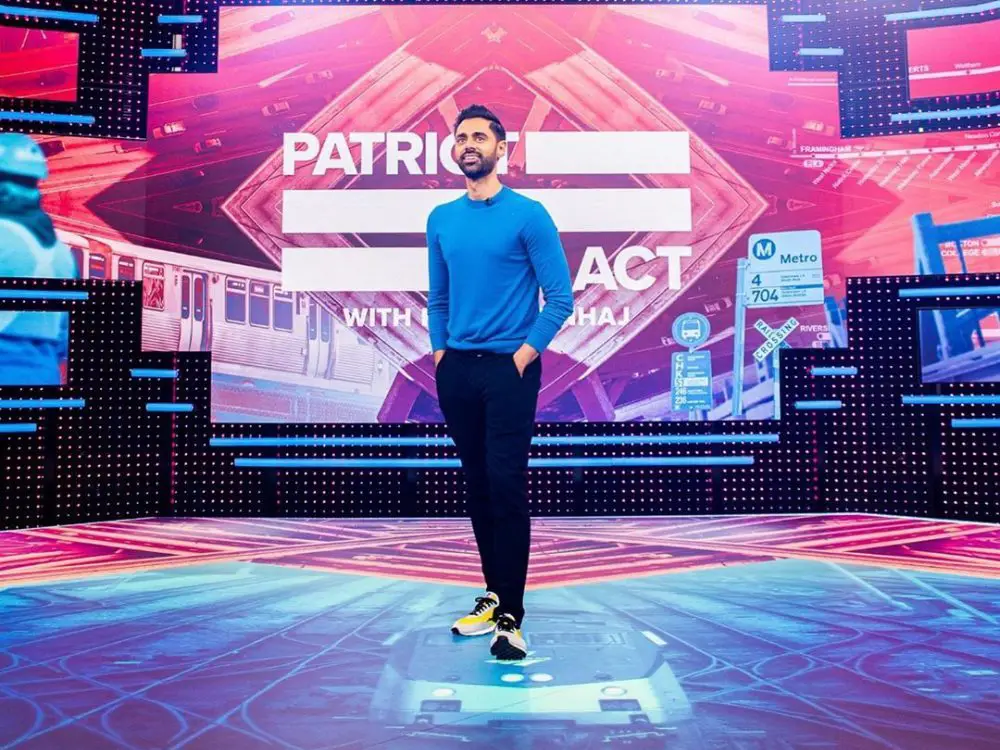As a South Asian and budding journalist, I am gutted to learn that Netflix will not renew comedian Hasan Minhaj’s “Patriot Act.” The likes of the program is something that has never been seen on U.S. television before and the ending of the show speaks to how the desires of the people are made secondary to a platform’s ratings and brand.
Personally, I have never felt included in the narrative of American talk shows. For instance, I will never forget a YouTube clip of “The Late Late Show with James Corden” titled “Happy Valentine’s Day (Except Pakistan)” from 2017. He discusses Pakistan’s ban on Valentine’s Day and then makes the joke “That’s bad news for Pakistani men trying to get some ankle tonight.”
It was at that moment that I realized Pakistan would always be the butt of the joke as Westerners continue to ridicule its conservatism, its Muslim population, or make references to terrorism. One person in the comments section who reflected my sentiments said: “You might not have realized this but Pakistan is a lot different from the UK or USA. So next time maybe you should do a little bit of research before speaking. And also about the ban: VD was banned because it’s not in our culture. And also we have many more important things to worry about in our country than this ‘celebration’. In the last six days there have been seven terrorist attacks here, so don’t worry about us missing the VD fun because VD is the last thing we’ll worry about.” This incident was one among many that proved that the white hosts dominating the U.S. talk show field would not give my desi community the respect it deserved.
And then entered Hasan Minhaj. Coming on to the talk show scene with “Patriot Act” in October 2018, this Indian and Muslim host finally allowed South Asia to defend itself. He dared to speak out about current events and corrupt politicians, as well as discussed things that spoke to the desi population. His audience was filled with desis and non-desis alike, making clear that Minhaj wasn’t being exclusive in his content like Corden was. The public was finally shown South Asia from the perspective of one of its descendants, and not a discriminating outsider.
One minute he was explaining hype culture and how fast fashion brands like Fashion Nova impact the economy, and the next he was hosting a segment where desi kids got to talk about balancing their South Asian culture with a conflicting American one. While watching “Patriot Act,” I truly felt I was being both educated and recognized. In one episode, Minhaj presented a video about applying to be in the CIA, and highlighted just how corrupt and anti-Muslim it is. He also made jokes tailored for the South Asian community; one night, he quipped: “Americans hit on the arm, and bruise your body. Indians slap on the face and scar the soul.”
Minhaj also encouraged the concept of not changing to conform to the dominant American way. One way he did this was by placing emphasis on pronouncing names correctly. To me, my name is pretty simple and just two syllables: It should be pronounced as “fuh-rah.” My whole life, I have been called every variant but that and had it misspelled as well; I am certain that people with non-American names can relate to the sentiment of having two names: an ethnic name and an Americanized one. Hence, when he corrected Ellen Degeneres‘ mispronunciation of his name on her show, I could understand where he was coming from.
The name of his show, “Patriot Act,” was powerful too. The original Patriot Act was put into effect by President Bush after 9/11 as a means of stopping terrorism. For those unaware, that act made it legal for the government to tap phone lines and surveil unknowing citizens, and it ultimately targeted minorities. The title established that Minhaj isn’t just a comedian. No, he took contemporary politics and broke it down to the micro level, allowing the public to understand how world events are affecting our daily lives, for better or for worse. He differed from other talk show hosts because he didn’t wait for news to be in the headlines and he didn’t forget about events after they were gone.
Instead, he allocated full episodes to topics that mattered, regardless of the backlash. In fact, fans believe Netflix canceled his show because of his controversial statements. For instance, he devoted a full episode to Saudi Arabian Prince Mohammed bin Salman’s complicity in the death of journalist Jamal Khashoggi. Minhaj said, “And it blows my mind that it took the killing of a Washington Post journalist for everyone to go, ‘Oh I guess he’s really not a reformer.’ Meanwhile, every Muslim person you know was like, ‘yeah no s—.’” He concluded, “MBS is not modernizing Saudi Arabia; the only thing he’s modernizing is Saudi dictatorship.”
Minhaj was not afraid to say what the world was thinking about the journalist’s murder. Still, Saudi Arabia was angry over the allegations and Netflix was forced to censor the episode. This wasn’t the first time he was in hot water for his political jokes, and though Netflix won’t confirm it, that may be the reason “Patriot Act” was canceled.
Many viewers across the country clearly wanted it to continue. “Nooooo, how can you not be there in November for the elections in the US? Or just not be there at all,” wrote film director Kunal Kohli. “Loved this show and all the comments you made on it. Only complaint was too few episodes! Demand a comeback.” Culture critic Soraya Nadia McDonald tweeted, “This is such a shame. Hasan was doing something needed and special, and spoke with such authority and clarity about issues centering South Asians.”
https://twitter.com/kunalkohli/status/1295940195347394560
The cancellation of the “Patriot Act” evokes the recurring problem of shows being canceled that actually cater to the public’s demand. His show was loved by all ages and audiences, yet Netflix chose to remove it from their programming. Instead of seeing the clarity and refreshing honesty Minhaj brought during this era of misinformation, Netflix was more concerned with the amount of money it was making. This wasn’t even a matter of ratings, as the show had a large following.
Netflix does not comprehend just how necessary his show was to providing an outlet for the desi and Muslim community too. Within the past four years, racism has run rampant and hate against Muslims continued, seen in the words of President Trump himself. In America, where capitalism is put before the needs of the people, the ones left hungry or poor or working multiple jobs, Minhaj gave hope for a more truthful, unified public. Netflix ripped that away from the viewers’ hands, removing any path to clarity.
At the end of the day, corporate greed reigns supreme once more, while America loses a vital source of journalism from the rarely heard voice of a South Asian Muslim.

















